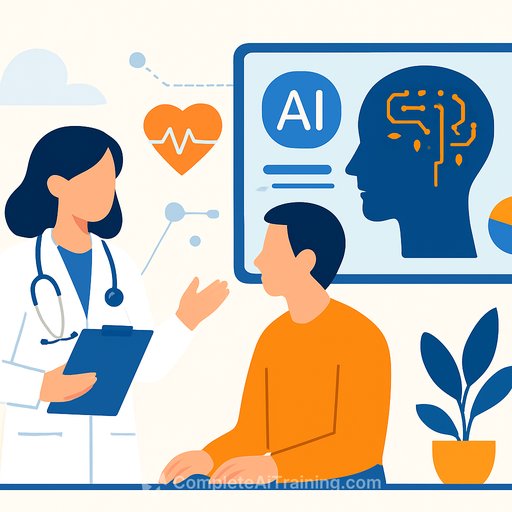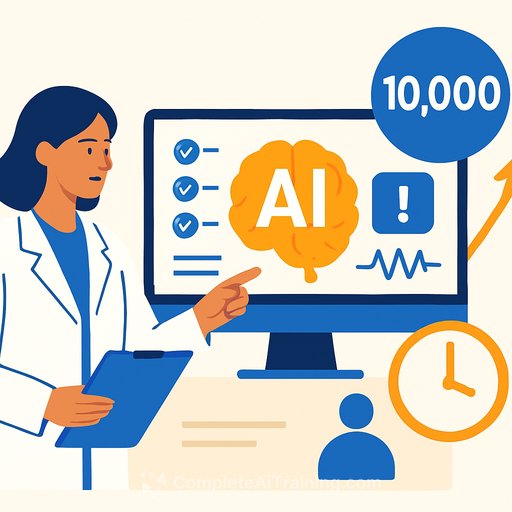AI Summit puts patient needs first in healthcare AI
Mayo Clinic's AI Summit in Rochester, Minnesota, brought clinicians, scientists, engineers and innovators together with a clear message: keep patients at the center. The event, led by Dr. Cui Tao with chairs Dr. Hamid Tizhoosh and Dr. Fred Fan, focused on practical AI that improves care delivery, outcomes and trust.
Ziad Zoghby, M.D., Nephrology, presented a poster at the summit, reflecting the strong clinician presence and hands-on research energy throughout the event.
Patient needs drive AI innovation
Dr. Clark Otley, chief medical officer of Mayo Clinic Platform, underscored that leadership in AI starts with responsibility to patients. People expect care that is improved, accessible, personalized and affordable - backed by trusted information and strong privacy protections.
Dr. Matthew Callstrom, medical director of Mayo Clinic's Generative AI Program, added, "When you start talking to patients about how important AI will be for their healthcare, they start to raise their hand and say, 'Please include me. I want to have the best possible outcomes.'"
From reactive to proactive care
Speakers called for a shift from symptom-based care to earlier, more targeted interventions. Dr. Callstrom shared the story of a patient with rheumatoid arthritis whose disease progressed through rounds of trial-and-error treatment.
AI can help predict which patients are likely to respond to methotrexate or targeted therapies, so clinicians can select effective options sooner and avoid avoidable harm.
Mayo Clinic Platform: A foundation for progress
A core element of Mayo's Bold. Forward. strategy, Mayo Clinic Platform is building a rich dataset of de-identified patient information to fuel clinical-grade AI. Dr. Otley outlined a framework for responsible deployment: ethical development, human-centered design and rigorous scientific evidence.
The objective is clear - augment healthcare teams with tools that integrate into workflows and improve decisions, not replace clinicians.
AI that solves real problems across specialties
Dr. Otley highlighted practical advances in radiology, mammography, personalized medicine and mental health - areas where AI can improve diagnostic accuracy, efficiency and access. Dr. Callstrom pointed to tools that reduce administrative load by streamlining chart review and decision support.
He also noted emerging work in voice analysis for diagnosis, digital pathology, genomics and cancer care. A concrete example: remote monitoring that flags fall risk and alerts care teams to intervene before harm occurs.
What healthcare leaders can do now
- Define patient-first outcomes for any AI project: faster diagnosis, fewer adverse events, lower cost, better access.
- Start with high-yield use cases: triage, imaging prioritization, documentation support, and population health risk stratification.
- Build strong governance: bias assessment, model monitoring, incident response and patient privacy protections.
- Keep clinicians in the loop: clear model outputs, uncertainty flags and easy override/feedback mechanisms.
- Measure end-to-end impact: clinical outcomes, workflow time saved, equity metrics and patient-reported experience.
- Invest in data quality and interoperability to support safe deployment and continuous learning.
- Upskill teams on AI literacy, privacy and safety; partner with IT and compliance from day one.
- Pilot fast, scale what works; retire what doesn't.
Responsible AI standards and training
For regulatory context on AI in clinical software, see the U.S. FDA's guidance on AI/ML in Software as a Medical Device here. For risk management practices, review the NIST AI Risk Management Framework here.
If your organization is building AI skills across clinical, operations or data teams, explore role-based learning paths at Complete AI Training.
Featured voices
- Dr. Cui Tao, chair, Department of Artificial Intelligence and Informatics
- Dr. Hamid Tizhoosh and Dr. Fred Fan, summit chairs
- Dr. Clark Otley, chief medical officer, Mayo Clinic Platform
- Dr. Matthew Callstrom, medical director, Generative AI Program
- Dr. Jeroen van der Laak, Radboud University Medical Center
- Dr. Yifan Peng, Weill Cornell Medicine
- Dr. Greg Corrado, Google Research
- Ziad Zoghby, M.D., Nephrology (poster presenter)
The message was consistent throughout the summit: AI belongs in healthcare when it earns clinician trust, protects patients and delivers measurable, patient-centered outcomes.
Your membership also unlocks:






